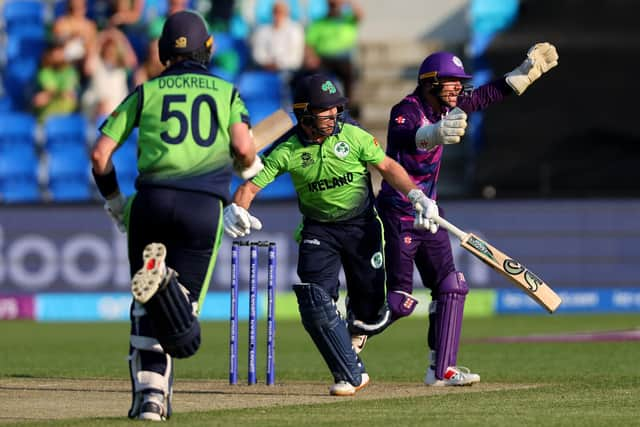T20 World Cup: Scotland brought back to earth as Ireland defeat dents Super 12 hopes
The Scots seemed on their way to a second-straight victory in the tournament as they bowled Ireland for 61 for 4 having set a target of 177 runs, but the fifth-wicket pair of Curtis Campher and George Dockrell produced a masterclass to turn the tables.
They put on an unbroken 116 in just 57 balls, Campher with a swaggering 72 not out off 32 and Dockrell making an unbeaten 39 in the supporting role.
Advertisement
Hide AdAdvertisement
Hide AdIn the end Ireland made things look easy, wrapping up their six-wicket success with an over to spare, but with high stakes and pressure piling up this was nothing short of remarkable. Both sides now face tense final matches as they seek to seal their spot in the Super 12 stage.
Scotland captain Richie Berrington was staying positive after the setback.
“We know from last year these group situations are never straight forward, but we’ll learn from today, reflect on what we need to and come back strong in our final game,” he said.
“We certainly put Ireland under pressure early on but give credit to the boys who put the partnership on. It was an excellent knock from Curtis, credit to them.”
Scotland opted to bat first but faced early strife when George Munsey fell in the second over. Munsey’s unbeaten 66 had underpinned their shock win over the West Indies, but there was no repeat as he played around Mark Adair’s first delivery to fall lbw.


Fellow opener Michael Jones would go on to score a fine 86 – Scotland’s record score of the tournament – but he endured a rocky start, taking eight balls to get off the mark.
Matthew Cross got things moving with three boundaries off Barry McCarthy’s first visit, a sign of things to come for the seamer as he shipped 59 off four ragged overs.
A score of 39 for one from the powerplay still looked light, but Jones was warming up nicely. He pulled McCarthy for the first six of the day, hit hard through the covers and swatted Josh Little for a 98-metre blow over deep square.
Advertisement
Hide AdAdvertisement
Hide AdCross fell for 28 as Campher struck with his first ball but Jones progressed to a 38-ball half-century.
Campher and Adair both bowled impressively at the death, and Jones eventually fell when he lofted Little to long-on, but there were plenty of runs on offer from McCarthy and Gareth Delany as the target crept towards nine-an-over.
That left Ireland in need of a strong start but instead they lost both openers cheaply.
Captain Andy Balbirnie slashed Brad Wheal low to point for 14, before the dangerous Stirling feathered Safyaan Sharif behind.
The Scottish bowlers made further inroads – Mark Watt tempting out Lorcan Tucker and Michael Leask taking care of Harry Tector – carrying all the momentum at halfway with Ireland at 65 for four.
Dockrell signalled the start of the fireworks by launching Chris Greaves for six in the 12th and things never slowed back down as Campher teed off. There was 18 off Watt’s next over, 14 from Wheal and 17 more from the usually reliable Josh Davey.
A steepling rate had been brought fully under control to leave 24 needed off the last three overs and Campher made it look like a breeze, hitting the ropes with each of his last four balls to complete a stunning turnaround.
Comments
Want to join the conversation? Please or to comment on this article.